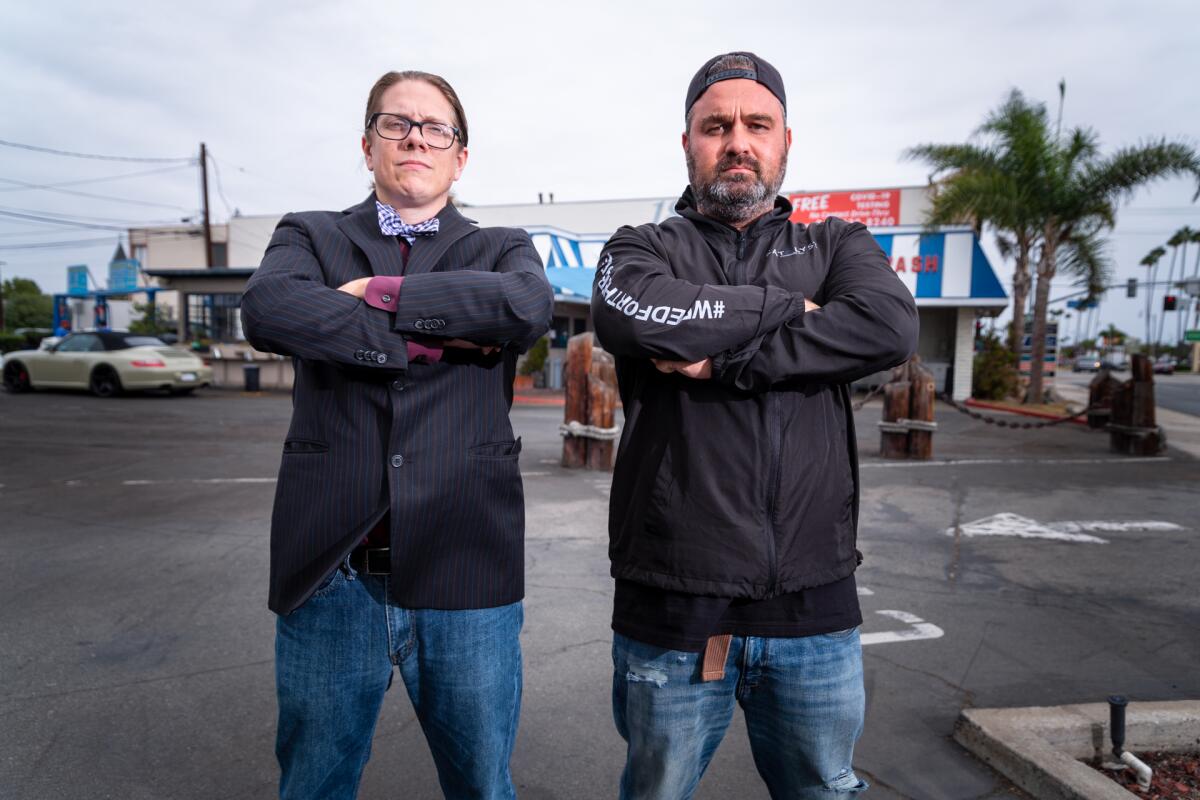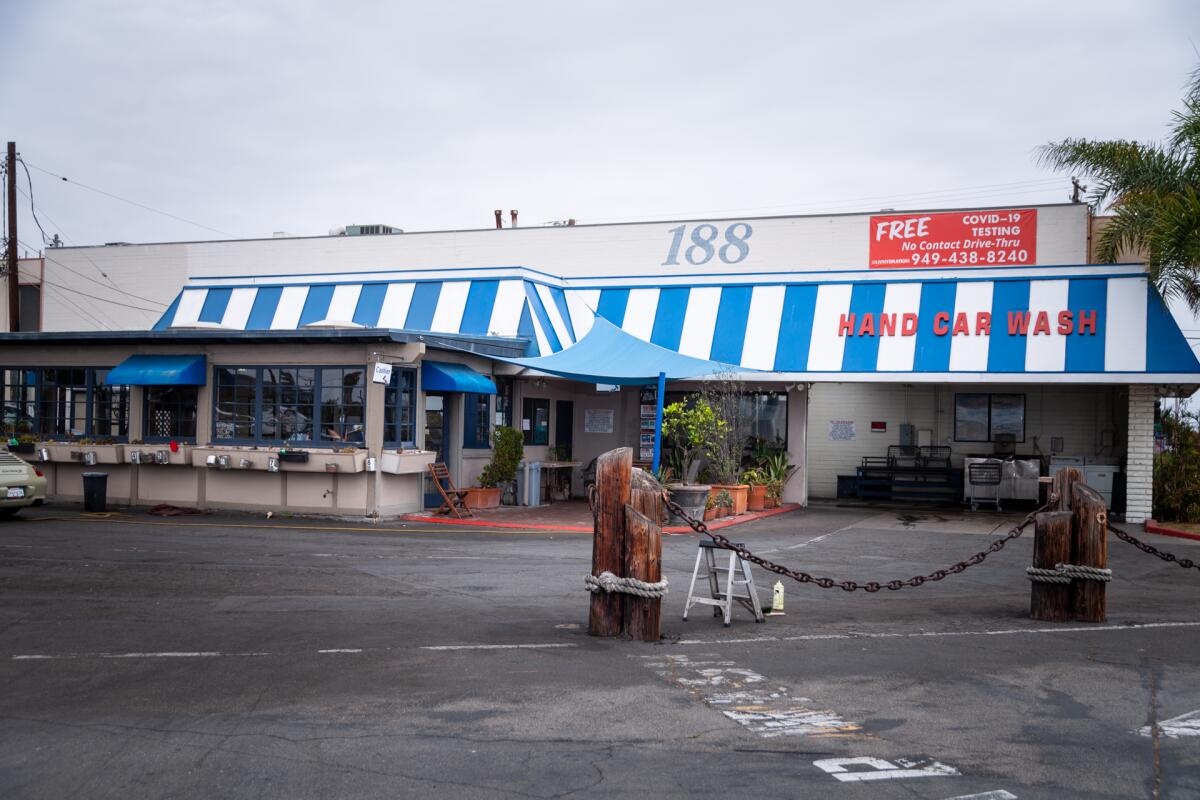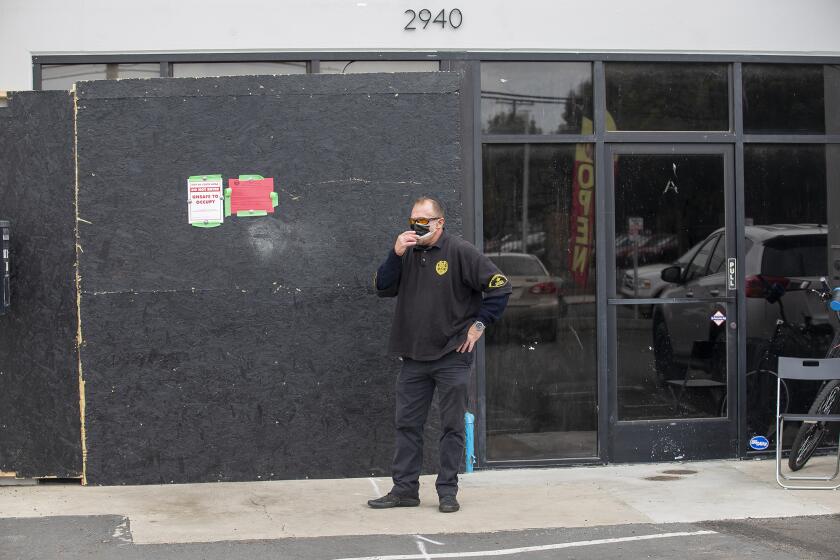Cannabis hopefuls up in arms as Costa Mesa’s application process rolls on without them

- Share via
Two weeks after Costa Mesa began accepting pre-applications for retail cannabis businesses, staff have received at least 19 requests for dispensaries and are moving ahead in their review, even as one applicant seeks a restraining order to halt the process.
Co-owners of RD x Catalyst-Costa Mesa LLC claimed in an Aug. 11 lawsuit the City Council unfairly delegated the creation of an application process to City Manager Lori Ann Farrell Harrison who, in turn, gave preferential treatment to certain applicants and edged others out.
The suit alleges city staff talked behind-the-scenes with industrial cannabis operators — currently doing non-retail business in the city’s Green Zone under 2016 voter-approved Measure X — and crafted a process that prioritized them for dispensary approval.
“This process is not happening in the light of day for the public to see what’s going on,” Long Beach attorney Damian Martin, one of the petitioners, said Tuesday. “It’s all happening in the back channels.”
A lawsuit filed Tuesday claims the Costa Mesa City Council defied the intent of Measure Q when it allowed the city manager to unilaterally create rules for processing retail cannabis permit applications.
Martin, alongside co-owner Elliot Lewis, on Tuesday asked a judge to grant a restraining order to prohibit the city from accepting and processing all retail cannabis land use applications. They want the procedure to be re-established with public input before the City Council.
The hearing was continued to Sept. 8. City Atty. Kimberly Hall Barlow said by email Tuesday she was “confident in the city’s position” but declined to speak further on the lawsuit or how staff created the approval process.
Information released days before the city began taking proposals stipulates a Phase 1 would allow “pre-applications” from Measure X business wishing to establish dispensaries in Costa Mesa’s commercial zone or looking to add cannabis delivery service to existing permits.
Candidates eligible for a social equity program — which aims to offer opportunities to those negatively impacted by the historic criminalization of marijuana, overturned by California’s Proposition 64 — would also be considered under Phase 1 through Sept. 10, according to the city’s website.
Six months after Costa Mesa voters approved Measure Q, city officials Tuesday adopted legislation intended to regulate dispensaries and delivery services.
All other candidates may apply under Phase 2, which begins Sept. 13. However, only 15 business permits will be processed at one time.
A city spokesman said Tuesday Costa Mesa has so far received 17 pre-applications for retail cannabis storefronts, four submissions for non-storefront delivery services and two social equity applications.
But while city officials declined to speak further, a declaration provided to the court by Sheri Vander Dussen,
assistant director of the city’s office of economic and development services, sheds light on how requests for dispensaries are being handled and indicates Measure X candidates are, indeed, ahead of the pack.
Efficiency or unfair advantage?
Vander Dussen explained the city subdivided its approval process into phases, because “limited staffing makes it impossible to process more than a certain number of applications at a time.” She said Measure X businesses were given Phase 1 consideration because they’d previously gone through much of the permitting process for their existing permits.
“It was anticipated by staff that the processing of retail applications for these businesses…would be simplified and streamlined, hastening the processing and allowing for staff to quickly move on to other applications,” Vander Dussen declared.
She further stated on Aug. 12, the day the city opened its pre-application process, requests were received from “each of the 17 existing Measure X businesses/owners.” Among those, 14 were being reviewed and could move on to apply for cannabis business permit within a week.
Among the two social equity applications received, only one was deemed complete and was pending approval to be placed on a wait list, Vander Dussen said.

Martin said in an earlier interview when he and Lewis learned only Measure X and social equity candidates would be considered in Phase 1, they attempted to find qualifying partners to team up with.
The social equity component, he added, proved too high a hurdle to clear. Only decriminalized marijuana-related felons who qualified for low-income status and had lived in Costa Mesa for the past five years would be considered — a more stringent set of requirements than other cities have drafted.
So, RD x Catalyst-Costa Mesa looked for Measure X business partners and had garnered some interest. But when Martin and Lewis filed their pre-application on Aug. 12 at 8:32 a.m., mere minutes after the window had opened, there was no way to specify they were submitting as Measure X candidates.
The attorney later learned through Vander Dussen’s testimony the city created additional documentation for Measure X applicants to submit but hadn’t posted it to its online application portal until Aug. 12 — the day pre-applications were accepted but, according to Martin, after Catalyst had submitted its own paperwork to be among the first 15 applicants.
Council members on 4/20 favored a new rule regulating retail cannabis sales and delivery, saying a legal market would drive out illicit operations. But some are doubtful.
Vander Dussen also declared that city staff directly reached out to all Measure X businesses on Aug. 10 to share with them the documents required for approval, a move Martin decried.
“They emailed all the Measure X people on the side. They didn’t email anybody else,” he said Tuesday. “If we’d gotten the email on the 10th, if I knew what I had to do, I could have reached out to people.”
Instead, the pre-application Martin and Lewis had submitted, at the cost of $15,000, was deemed ineligible because, Vander Dussen explained, it had lacked the required documentation.
The assistant development director indicated RD x Catalyst-Costa Mesa could still find a Measure X partner by the Sept. 10 Phase 1 deadline or apply in Phase 2.
“Likewise, if petitioner partners with a qualified social equity applicant, those applications are currently being accepted,” she added.
A new mission
Now, with little chance of being approved for a cannabis business permit anytime soon, Martin and Lewis are left holding the bag on a Costa Mesa rental property they leased in June.
They paid $75,000 for a lease-to-own option on a car wash on 17th Street that met the city’s many cannabis zoning requirements. It’s unclear what will happen with the property if their application does not go through.
“Catalyst has lost its place in line…because we didn’t submit two documents the city didn’t make available until after we submitted,” Martin said.
Now, his and Lewis’ focus has shifted from successfully applying for a cannabis business permit in Costa Mesa to winning the lawsuit so what they believe is an undemocratic process can be corrected.
“We’re on a path now,” the attorney said. “I’ve got my hearing on the 8th, and I’m trying to win my hearing — I want to win.”
All the latest on Orange County from Orange County.
Get our free TimesOC newsletter.
You may occasionally receive promotional content from the Daily Pilot.







